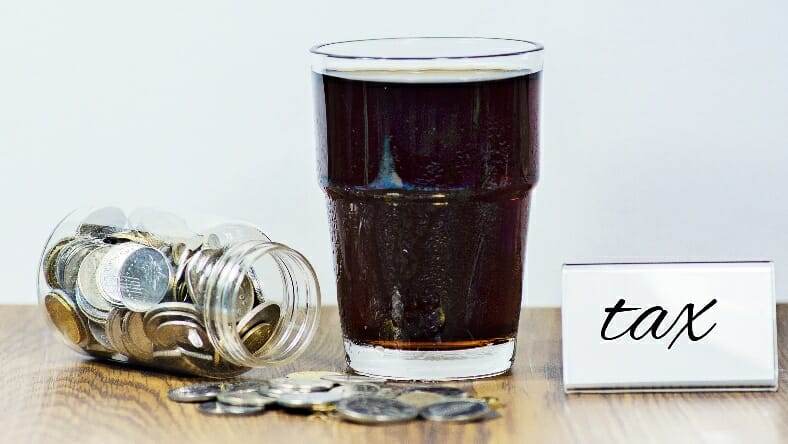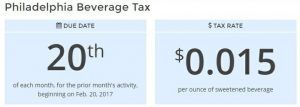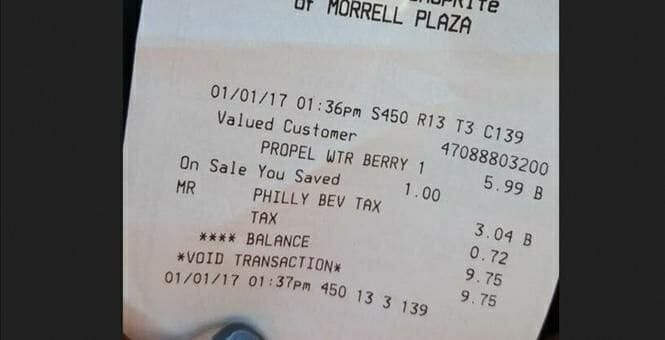
The Philadelphia Soda Tax Is Now In Effect - Time to Start Drinking Water
 Last year, the city of Philadelphia decided to pass into law a “beverage tax,” which taxes the sugary drinks you consume at the rate of 1.5 cents per ounce. At the time, there was some considerable outcry from residents of the city. Nevertheless, the government stuck to their guns.
Last year, the city of Philadelphia decided to pass into law a “beverage tax,” which taxes the sugary drinks you consume at the rate of 1.5 cents per ounce. At the time, there was some considerable outcry from residents of the city. Nevertheless, the government stuck to their guns.
Well, at the turn of this new year — on 1/1/2017, in fact — the tax was enacted. Consumers are quickly feeling the effects, and are none to happy about it.
What It Is
Taken directly from their city government website, Philadelphia lawmakers explain where the tax is to be levied.
The tax is not just on sodas. This tax is on any non-alcoholic beverage, syrup, or other concentrate used to prepare a beverage that lists as an ingredient any form of caloric sugar-based sweetener, including, but not limited to sucrose, glucose, or high fructose corn syrup.
Drinks considered “diet” or “zero calorie” are also taxed. Specifically, this tax is on any non-alcoholic beverage, syrup or other concentrate used to prepare a beverage that lists any form of artificial sugar substitute, including stevia, aspartame, sucralose, neotame, acesulfame potassium (Ace-K), saccharin, and advantame.
A quick look at social media shows hundreds of posts today from people taking screenshots of their receipts to show just how much this tax will actually cost you. You hear the details of 1.5 cents per ounce and might not think much of it. When you start to buy gallons, six packs, 12 packs of your favorite soda or sports drink, though, you’re going to pay quite a bit more than you expect. Let’s have a look at an example.

On the receipt above, you’ll notice a consumer purchasing a 10 pack of Propel Water (w/ Berry) for a retail price of $5.99. These are just over 20 oz. a bottle, so the pack is a little over 200 oz. of total liquid. At a tax rate of 1.5 cents per ounce, the consumer ended up paying $3.04 just in the beverage tax alone.
Then, because democracy is so awesome, the sales tax is added AFTER the beverage tax. This means that the great residents of Philadelphia are paying 8% sales tax ON their beverage tax. A $5.99 10-pack of Propel water (which actually doesn’t have any sugar, ironically), now costs $9.75. This particular individual was stunned to see the cost, so they voided the transaction. And I don’t blame them.
Who Loses from the Soda Tax?
When you consider what the Philadelphia soda tax is meant to accomplish, there are two clear cut losers:
- The Sugar / Sports Beverage Industry – With the cost of everyday drinks like Gatorade and Pepsi being increased by as much as 150% (depending on the size of the container), the beverage industry is going to see a steep decline in demand. There’s just no way around it. When you were paying $.30 for a 12oz can of Coca Cola at the grocery store and now are paying $0.48 cents a can, there will be a group of people that say “No, thanks.” This decline in demand will, of course, be limited to just the city of Philadelphia. If the merits of this tax are well publicized in the coming months, though, other cities could join in for the added revenue.
- The Wallets of the American Consumer – I wouldn’t call myself an addict when it comes to drinking soda or sports beverages. But when they go on sale at the grocery store, I’ve been known to buy them in quantity (“four 12-packs for $10” happens a few times a year, and I like to buy just that many). If there’s 144 ounces per case of 12 cans, that’s 576 ounces of soda in my $10 purchase. In Philadelphia, my $10 purchase is now an $18.64 purchase… and that’s not good for my wallet. The same goes for consumers who spend $1.99 on a gallon of iced tea (now with an additional tax of $1.92) or a liter of Mountain Dew (plus the new tax of $0.51). Consumers will lose more money for buying the same everyday items.
Who Wins from the Soda Tax?
Once again I can find two clear cut examples of positive outcomes from the Philadelphia beverage tax:
- Early Childhood Education & City Programs – The city of Philadelphia anticipates that $91 million annually will be collected from this soda tax, and the majority of that money will go to fund early childhood education, parks, and libraries. The remaining funds (roughly 20%) will target other city programs and employee benefits. The sum raised is not as much as you might anticipate given just how much the cost of beverages will increase, but remember this is strictly for one city.
- The Health of the American Consumer – Allow me to speak from experience: the sheer amount of sugar in my beloved bottle of Snapple Apple is more than I should likely be consuming in a week, let alone in 15 minutes. The reason these drinks taste as delicious as they do is because they are dripping with the sweet stuff. Philadelphia is not only looking at a new revenue source, but a way to tackle diabetes and obesity. A “sin tax” has always been defined as a tax on things like gambling, tobacco, and alcohol, but it would appear we may be getting ready to add sugar and sports drinks to the list. If this ever reaches Connecticut, the increased cost may just be enough to get me to start drinking water exclusively (or at least a LOT more than I do).
Grocery stores in the city are doing different things in order to inform consumers their drinks are going up in price. Some list the full price on the sticker below the item on the shelves, some have sent out notices in their circulars, and others have decided to avoid the subject. The latter are just ringing up surprised consumers at the register, which I wouldn’t imagine going over too well for those not paying attention.
Philadelphia makes up roughly 0.5% of the entire US Population. So, while this is just one city, it’s a big one. This tax is now on the minds of 1.55 million people.
Keep an eye on this tax to see if your city adopts a similar policy and plan for a healthier lifestyle to keep your wallet and your waistline in check.

Article comments